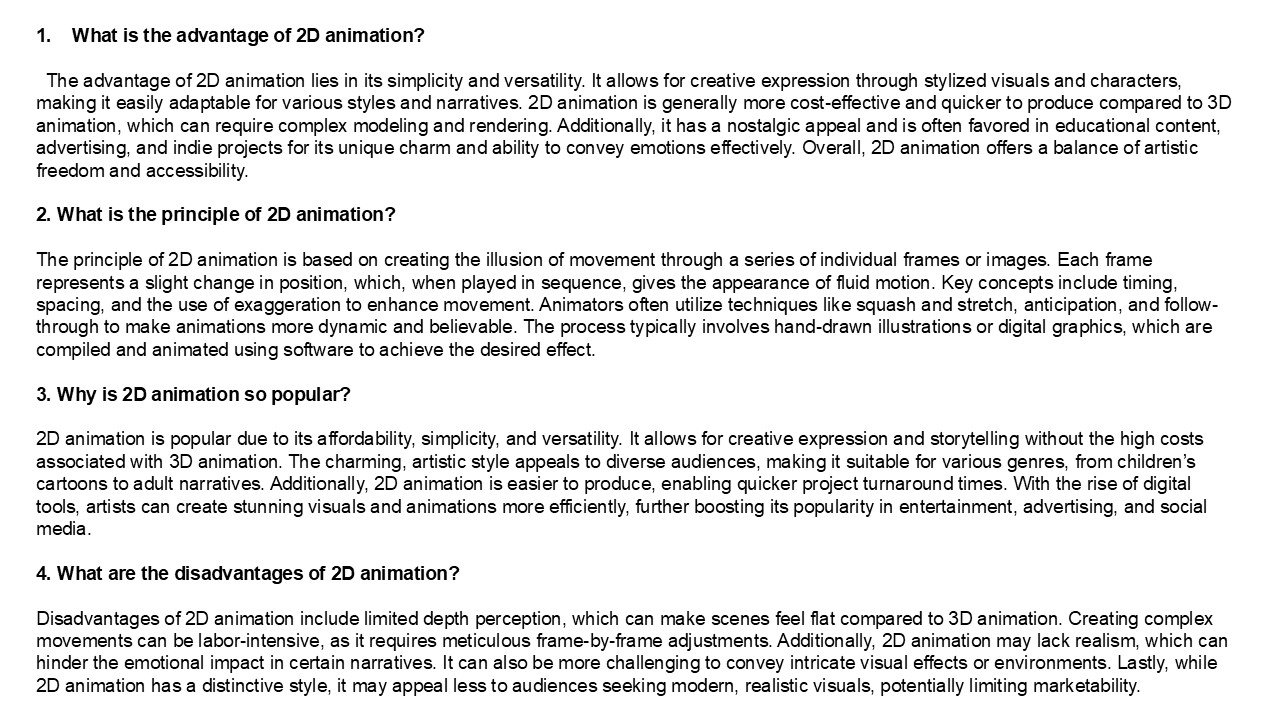Engaging Audiences Through 2D Animation: The Power of Visual Storytelling
Title:
Engaging Audiences Through 2D Animation: The Power of Visual Storytelling
Description:
2D animation is a popular art form known for its ability to tell complex stories and express emotions through simple visuals. It creates the illusion of movement by showing a sequence of individual frames quickly, using techniques like tweening and keyframing. While 2D animation is widely appreciated, it has some drawbacks. Creating hand-drawn frames can be very time-consuming, and it requires skilled artists to produce high-quality work. This complexity often leads to higher costs, as significant time and talent are needed for the animation process. Despite these challenges, 2D animation remains a favored choice in many media due to its unique ability to engage audiences and convey narratives effectively. –
Number of Views:0
Date added: 6 November 2024
Slides: 3
Provided by:
visualsculptors
Category:
How To, Education & Training
Tags:
Title: Engaging Audiences Through 2D Animation: The Power of Visual Storytelling
1
- What is the advantage of 2D animation?
- The advantage of 2D animation lies in its
simplicity and versatility. It allows for
creative expression through stylized visuals and
characters, making it easily adaptable for
various styles and narratives. 2D animation is
generally more cost-effective and quicker to
produce compared to 3D animation, which can
require complex modeling and rendering.
Additionally, it has a nostalgic appeal and is
often favored in educational content,
advertising, and indie projects for its unique
charm and ability to convey emotions effectively.
Overall, 2D animation offers a balance of
artistic freedom and accessibility. - 2. What is the principle of 2D animation?
- The principle of 2D animation is based on
creating the illusion of movement through a
series of individual frames or images. Each frame
represents a slight change in position, which,
when played in sequence, gives the appearance of
fluid motion. Key concepts include timing,
spacing, and the use of exaggeration to enhance
movement. Animators often utilize techniques like
squash and stretch, anticipation, and
follow-through to make animations more dynamic
and believable. The process typically involves
hand-drawn illustrations or digital graphics,
which are compiled and animated using software to
achieve the desired effect. - 3. Why is 2D animation so popular?
- 2D animation is popular due to its affordability,
simplicity, and versatility. It allows for
creative expression and storytelling without the
high costs associated with 3D animation. The
charming, artistic style appeals to diverse
audiences, making it suitable for various genres,
from childrens cartoons to adult narratives.
Additionally, 2D animation is easier to produce,
enabling quicker project turnaround times. With
the rise of digital tools, artists can create
stunning visuals and animations more efficiently,
further boosting its popularity in entertainment,
advertising, and social media. - 4. What are the disadvantages of 2D animation?
- Disadvantages of 2D animation include limited
depth perception, which can make scenes feel flat
compared to 3D animation. Creating complex
movements can be labor-intensive, as it requires
meticulous frame-by-frame adjustments.
Additionally, 2D animation may lack realism,
which can hinder the emotional impact in certain
narratives. It can also be more challenging to
convey intricate visual effects or environments.
Lastly, while 2D animation has a distinctive
style, it may appeal less to audiences seeking
modern, realistic visuals, potentially limiting
marketability.
2
5. Why is 2D animation expensive? 2D animation
can be expensive due to the labor-intensive
process involved. Each frame must be meticulously
drawn or digitally created, requiring skilled
artists and extensive time. The need for
storyboarding, character design, and background
art further adds to costs. Additionally,
high-quality productions often involve multiple
revisions and detailed animations, increasing
both labor and resource expenses. Software
licenses and technology used for animation can
also contribute to the overall budget. Finally,
hiring experienced animators and voice actors can
significantly elevate production
costs. Visit VS Website See more Blog































